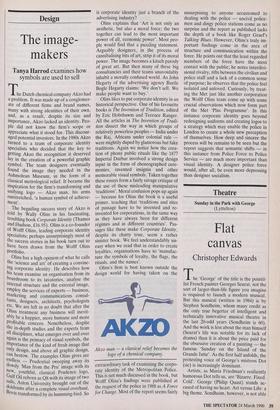But if design, composition etc are the first principles of
Seurat's art, Sondheim fails to obey some of the ground rules of musical theatre. The score is thin to the point of malnutrition. Staccato may be a way of suggesting the brush-stroke flickers of pointillism, but the slightness of the melodic line leaves dialogue and character development cruelly exposed. Praised as Sondheim often is for the strength of his lyrics, in this piece they just do not find enough support from the music. He is not after all a dramatist, however far removed he may be from the lush hypnotics of Andrew Lloyd Webber. Witty and clipped as some of the lyrics are, you are equally aware of their banality.
In the second half, set some hundred years later in the trendy gallery world of New York, we meet George's great- grandson — a multi-media artist who returns to France to drink at the well of his ancestor's inspiration. The first half, for all its drawbacks, contained enough diver- sions to keep me in my seat — which is more, I am afraid, than can be said for the second half.
One hundred years ago
WE omitted last week to record the return on this day fortnight of the Conservative candidate for the Stam- ford division of Lincolnshire by a very much reduced majority. The contest was a sharp one, and the Gladstonian candidate apparently a great favourite in the neighbourhood, in which he has been a resident for some time. But the Conservative candidate was also a good one, and there is no doubt that his greatly reduced majority is far from an insignificant sign of the times. Mr H. J. C. Cust, the Conservative, was returned for Stamford by a majority of 282 over his Gladstonian opponent, Mr Arthur Priestley (4,236 votes against 3,954). In 1886, the Conservative was returned unopposed. In 1885, before the division of the Liberal Party, Mr Lawrance polled 4,631 votes, against 3,530 given for Mr Cudlip, the Gladstonian candi- date, — majority, 1,101.
The Spectator, 22 March 1890
Television
Technical hitch
Wendy Cope
You know "The best-laid plans of mice and men"? How does it go after that?'
`It's Shakespeare. Urn. ". . . with this regard their currents turn awry and lose the name of action".'
'No, no. That's "enterprises of great pitch and moment".'
This isn't from a television programme. It's necessary to fall back on real life because the other participant in this dia- logue a) doesn't know how to programme his video and b) lost the instruction book- let, thereby threatening my plans to record certain items while we spent a long weekend away from television sets. Late on Friday afternoon there was some weep- ing and gnashing of teeth (the Bible presumably) and there were frantic tele- phone calls to the rental shop, where the staff were very nice and keen to help but couldn't find their copy of the instructions either.
Eventually I figured it out. With the 'on' times, the 'off' times and the channel numbers all present and correct, I pressed the timer button. A little clock-face appeared but it was flashing on and off, which didn't seem right. By now I'd had enough. What the hell, it's only television, let's go.
.11
Well the boat wasn't pee-coloured when we set out.' (Channel 4, 8.30 p.m.). This has a few things going for it — elaborate sets, a very confident host called Richard O'Brien and, above all, pace. The contestants were three men and three women, all in their twen- ties, who took it in turns to attempt various tasks — designated physical, mental, skills or mystery. One game involved target shooting, another was a treasure hunt, with clues and a map. The young people, who probably know all about Venn diagrams and tessellations, had difficulty with a mental arithmetic game, which required knowledge of terms like a gross and a score.
All the games were played against the clock, so there was a great deal of tension and yelling. The participants weren't com- peting against each other but together. If one person did badly, he or she was letting the side down. There were moments when you thought somebody was about to burst into tears, smash up the expensive equip- ment or swear at his or her team-mates. In fact, I'm sure it must have happened and been cut out. If the makers of The Crystal Maze run short of ideas for mental games, they might consider asking contestants to programme an unfamiliar video recorder.


















































 Previous page
Previous page